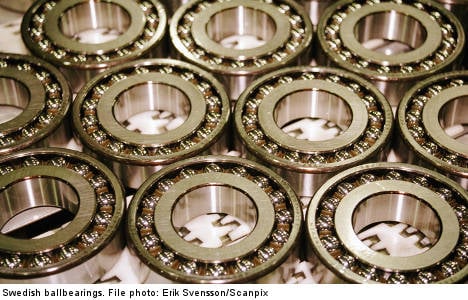“Since the finance and debt crisis began, Sweden’s share of exports in relation to GDP has fallen nearly 5 percent,” confederation economist Björn Lindgren wrote in a commentary published on Monday.
“Only Luxembourg (which still has the highest share of all member states), and Finland (whose powerhouse Nokia has experienced difficulties) have performed worse.
“It is time for a wake up call to our national policymakers.”
In 2012, the overall value of Swedish exports dropped by 3.5 percent, resulting in a 1.2 percent decline in exports as a share of GDP.
“Moreover, these statistics show that Sweden is at best a mediocre exporter, and it is time for greater political awareness,” he wrote.
“This also indicates a paradigm shift where exports are no longer the growth driver for Sweden as they have been for 15 years.”
Lindgren said Sweden’s worsening export sector came as a result of many Swedish businesses moving production abroad, warning the decline was a “long-term trend”.
He went on to argue that because Swedish exports depend to a lesser extent on the crisis-ravaged countries in southern European, the drop in exports cannot be pegged solely to the euro crisis although the financial downturn was clearly taking its toll.
“From the early 1990s to 2007, when the financial crisis exploded, Sweden had a strong upward trend in the proportion of exports in relation to GDP. But now this trend has been broken and reversed to the current declining trend,” Lindgren explained.
In keeping with its pro-free market political heritage, the industry confederation advocated a review of labour costs in Sweden, while also discussing the impact of the strong Swedish krona, a topic which set the finance minister and the shadow finance minister on collision course as late as last week. Lindgren also urged corporate tax reform.
“Recently published data by the Statistisches Bundesamt [in Germany] show that labour costs in Sweden are higher than any other EU country,” Lindgren wrote.
“These costs are €42 per working hour in Sweden, which is €11 higher than in Germany and €14 than the euro area average.”
Lindgren noted that there was no sign that the Swedish krona would lose its strong standing on currency exchange markets any time soon.
“Which means that Sweden must be ready to improve its competitiveness even with these prerequisites,” he argued.
He further welcomed some recent changes to corporate taxes but said other countries had matched the reforms.
“The Swedish government must therefore continue to implement new measures that improve market conditions for Swedish companies that invest and create operations in Sweden,” he argued
The Local/at



 Please whitelist us to continue reading.
Please whitelist us to continue reading.
Member comments